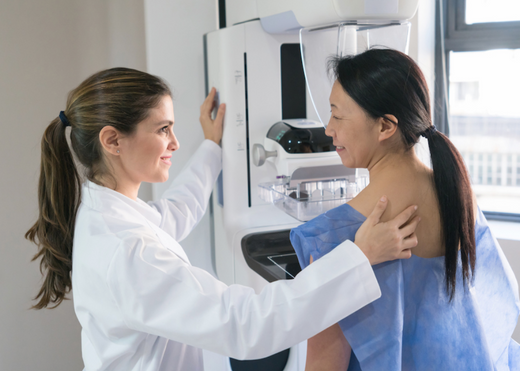Handy guide to performing a breast self-examination in 6 steps
Find out moreBreast Cancer Awareness Month, marked in countries across the world every October, helps to increase attention and support for the awareness, early detection, and treatment of this disease
Breast cancer is the most common cancer in women in the UK, with one woman being diagnosed every 10 minutes, and it is the leading cause of death in women under 50 years of age.1 A YouGov survey commissioned in October 2020 by the breast cancer charity ‘Breast Cancer Now’ found that almost half (47%) of women in the UK do not check their breasts regularly for potential signs of breast cancer, with one in 10 women having ‘never checked their breasts for new or unusual changes’. The survey asked women what prevents them from checking their breasts more regularly, and almost half (46%) said they ‘forget’.2
As many breast cancers are found by women themselves3 through self-examination or by accident, it is very important to become breast aware and get into the habit of regularly checking your breasts, as the earlier breast cancer is found, the better the treatment options are.
Why is it so important to check your breasts regularly?
Self-examination is a simple and entirely safe method of detecting changes in your breasts. It is important to do this regularly to be aware of your ‘normal’ breasts and therefore to detect changes at an early stage. Early detection nearly always leads to less invasive treatments and better outcomes, as cancer can be treated sooner.
In this blog, we are going to show you how you can perform a breast self-examination; you don’t have to be an expert; you need to get to know your breasts and what your ‘normal’ is.
There is no right or wrong way to check your breasts, and this guide is to help you get started and to get into a regular habit of checking your breasts monthly. Understanding the difference between normal lumps and ones you should be suspicious of is key in detecting early signs of breast cancer.
Awareness and early detection of any changes lie at the heart of effective treatment for cancer, so do make sure that you take time to check your breasts, and don’t hesitate to let your GP or specialist know about any changes that don’t seem normal for you, no matter how small. Check4Cancer’s Breast Cancer Clinic provides you with access to fast-track diagnostic investigations, without the need for a referral from your GP, if you think you may have developed recent symptoms of breast cancer.
Changes to breasts over the course of our lifetime can happen for many and varied reasons, but it’s always best to check on a regular basis, in order to rule out breast cancer.
References
1 https://breastcancernow.org/about-us/why-we-do-it/breast-cancer-facts-and-statistics
2 https://www.cancerresearchuk.org/about-cancer/breast-cancer/getting-diagnosed/screening-breast
To do a breast self-examination, you don’t have to be an expert; you need to get to know your breasts and what your ‘normal’ is.
How to perform a breast self-examination – a step-by-step guide
Self-examination is an essential part of being breast aware; it takes less than 10 minutes, and you do not have to be an expert to perform it. The primary purpose of breast self-examination is that you become familiar with what is ‘normal’ for your breasts so that you can spot any differences.
Equipment needed:
- A mirror
- Bed/sofa (so you can lie down) or even in the bath – whatever works for you
- Your hands and eyes!
Handy Hint – when should you perform your self-examination?
- The best time to do a monthly self-breast exam is about 10 to 14 days after your period has finished, as your breasts are not as tender or lumpy at this time in your monthly cycle.
- If you are post-menopausal, then you should check your breasts at the same time each month, so you don’t forget.

There is no right or wrong way to check your breasts, and this guide is to help you get started and to get into a regular habit of checking your breasts monthly. Understanding the difference between normal lumps and ones you should be suspicious of is key in detecting early signs of breast cancer.
Awareness and early detection of any changes lie at the heart of effective treatment for cancer, so do make sure that you take time to check your breasts, and don’t hesitate to let your GP or specialist know about any changes that don’t seem normal for you, no matter how small. Check4Cancer’s Breast Cancer Clinics provide you with access to fast-track diagnostic investigations, without the need for a referral from your GP, if you think you may have developed recent symptoms of breast cancer.
Changes to breasts over the course of our lifetime can happen for many and varied reasons, but it’s always best to check on a regular basis, in order to rule out breast cancer.
References
1 https://breastcancernow.org/about-us/why-we-do-it/breast-cancer-facts-and-statistics
2 https://www.cancerresearchuk.org/about-cancer/breast-cancer/getting-diagnosed/screening-breast

Professor Simon Russell
Deputy Chief Medical Officer and Advisor for Breast Cancer
Consultant Oncologist at Addenbrooke’s Hospital, Cambridge and Hinchingbrooke Hospital, Huntingdon, Cambridgeshire. Professor of Oncology, University of Rome Medical School. Professor Simon Russell is a Consultant Oncologist at Addenbrooke’s Hospital, Cambridge and Hinchingbrooke Hospital, Huntingdon. He leads the Urological Malignancy Service and has previously been lead clinician for the breast service. He is the lead for Radiotherapy for Genesis Cancer Care, Cambridge. He has served as the secretary of the British Uro-Oncology Group 2003-2015 and remains a Trustee. He was appointed Professor of Oncology at the University of Rome Medical School, Tor Vergata 2015. Simon joined Check4Cancer in 2018.
Find out moreKnowledge and support
Go to all articles
What is Breast Cancer Awareness Month? All You Need to Know
First introduced in 1985, Breast Cancer Awareness Month runs every October with the initial aim of encouraging breast cancer screening...
Read more
Do Mammograms Hurt?
How a mammogram works, how long it takes, if it’s normal to hurt, and what to expect after a mammogram.
Read more
What Happens At A Mammogram?
Looking at what a mammogram detects, how often you should have a breast screening, and what happens before, during and...
Read more